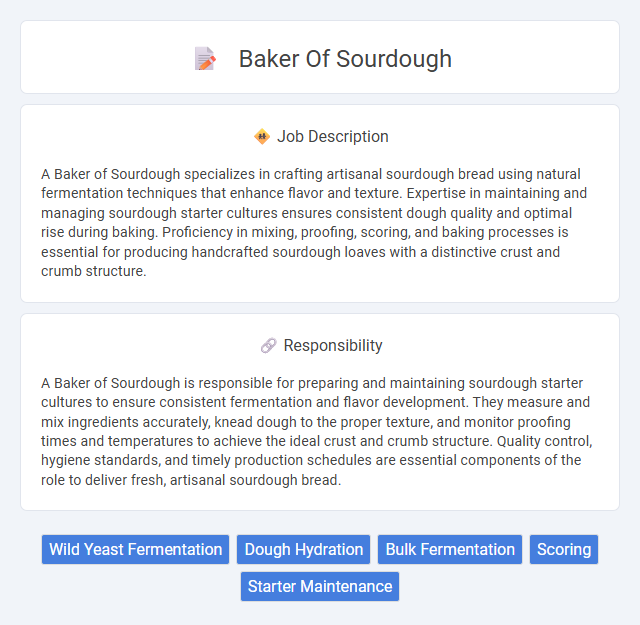
A Baker of Sourdough specializes in crafting artisanal sourdough bread using natural fermentation techniques that enhance flavor and texture. Expertise in maintaining and managing sourdough starter cultures ensures consistent dough quality and optimal rise during baking. Proficiency in mixing, proofing, scoring, and baking processes is essential for producing handcrafted sourdough loaves with a distinctive crust and crumb structure.
People with strong physical stamina and a passion for artisanal baking are likely to find the role of a sourdough baker suitable. Those comfortable with early mornings, repetitive tasks, and working in warm, humid environments may adapt well to the job conditions. Individuals with sensitivities to flour dust or requiring minimal physical exertion might face challenges in this profession.
Qualification
Expertise in sourdough fermentation, dough handling, and baking techniques is essential for a baker specializing in sourdough. Proficiency in understanding microbial cultures and fermentation times ensures consistent bread quality and flavor development. Strong attention to detail, physical stamina, and experience with artisanal baking equipment are critical to excel in this role.
Responsibility
A Baker of Sourdough is responsible for preparing and maintaining sourdough starter cultures to ensure consistent fermentation and flavor development. They measure and mix ingredients accurately, knead dough to the proper texture, and monitor proofing times and temperatures to achieve the ideal crust and crumb structure. Quality control, hygiene standards, and timely production schedules are essential components of the role to deliver fresh, artisanal sourdough bread.
Benefit
Working as a baker of sourdough most likely offers health benefits associated with preparing naturally fermented bread, which contains probiotics and may improve digestion. The role probably provides a creative outlet through the artisanal process of crafting unique loaves, enhancing job satisfaction. It may also offer steady demand in artisan bakeries, increasing job stability in a niche market.
Challenge
The role of a sourdough baker likely involves mastering the delicate balance of fermentation times, temperature, and hydration levels to consistently produce high-quality bread. Challenges may arise from the unpredictable nature of natural leavening, requiring constant monitoring and adjustments to maintain dough viability. Precision and patience are probably crucial to overcoming these difficulties and achieving the desired crust and crumb texture.
Career Advancement
Mastering sourdough baking requires deep knowledge of fermentation, dough handling, and artisanal techniques, laying a strong foundation for career growth in the culinary arts. Skilled bakers often advance to roles such as head baker, bakery manager, or product developer, leveraging expertise to innovate recipes and manage production. Continuous learning through workshops and certifications enhances prospects for leadership positions and entrepreneurship within the artisanal bakery industry.
Key Terms
Wild Yeast Fermentation
Mastering wild yeast fermentation is essential for a sourdough baker to create naturally leavened bread with complex flavors and optimal texture. The baker carefully cultivates and maintains a live sourdough starter, monitoring its microbial activity to ensure a balanced population of wild yeast and lactic acid bacteria. Proficient control of fermentation time, temperature, and hydration levels directly impacts dough rise, crumb structure, and crust development, resulting in artisan-quality sourdough loaves.
Dough Hydration
Crafting sourdough requires precise control of dough hydration, typically ranging from 65% to 85%, to achieve the ideal crumb structure and crust texture. High hydration doughs promote better fermentation and gas retention, resulting in an open crumb and moist interior. Mastery of water content adjustments directly influences fermentation time, dough elasticity, and final flavor profile in sourdough baking.
Bulk Fermentation
Bulk fermentation is a critical phase in sourdough baking that allows natural yeast and bacteria to develop flavor, texture, and strength in the dough. During this stage, the baker monitors temperature, hydration, and fermentation time to ensure optimal gluten formation and dough acidity. Mastery of bulk fermentation directly impacts the bread's crumb structure, crust quality, and overall taste profile.
Scoring
Expertise in scoring sourdough requires precision and consistency to ensure optimal oven spring and crust development. Master bakers use specialized tools such as lame or sharp blades to create intricate patterns that control dough expansion during baking. Proper scoring techniques enhance the bread's aesthetic appeal while improving texture and crumb structure, reflecting advanced artisanal skill.
Starter Maintenance
A Baker of Sourdough ensures consistent quality by meticulously maintaining the sourdough starter, monitoring its hydration, fermentation temperature, and pH levels to optimize yeast and bacterial activity. Regular feeding schedules and precise environmental controls are implemented to sustain a robust and active culture that imparts the signature tang and texture to the bread. Expertise in balancing starter freshness directly impacts dough rise, crumb structure, and flavor complexity, crucial for artisanal bread production.
 kuljobs.com
kuljobs.com